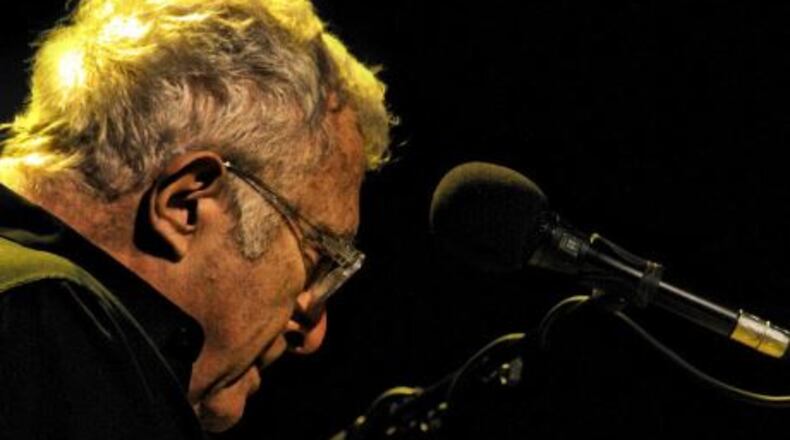READ MORE: Springfield business owner remembered as tough, but with a soft side
Then years, even decades later, we come across that smell, that taste, that sight or that sound, and we are back in that moment once again.
And so it was that about two weeks ago, after I saw Randy Newman appear on television to promote his new album, “Dark Matter,” I found myself in the moment on a gray day in December of 1974 in the University of Michigan Library listening to his third album, “Good Old Boys.”
I had just finished the fall term of my junior year at Wittenberg and was in Ann Arbor visiting my brother, Bill, then in graduate school at Michigan. As I recall, he had recently chased a burglar out of his apartment who was halfway in the back window when he discovered why my brother’s nickname was Ogre.
I had bought “Good Old Boys” at the recommendation of Springfielder Phil Hartje, whom I’d met in a history class at Wittenberg and who lived in an apartment on North Limestone Street with the late local baseball star and nice guy Greg Murphy, then a business major on the Tigers baseball team.
Album in hand, I left for the library when my brother left for class.
RELATED: Stafford: Springfield school named for Civil War general
I knew I was risking a scratch by using one of several industrial strength record players there. I knew, too, that the odds for a scratch increased every time I lifted the tone arm up so I could listen once again to the opening cut, “Rednecks.”
But the song had me in its grip.
Newman’s second album, “Sail Away,” had established his reputation for a somewhat oddball voice and old-fashioned musical approach to social commentary. That album’s cut was a sneakily innocent sounding ballad about the ugly process by which many Africans became African Americans by way of slavery.
“Sail away … sail away; we will cross the mighty ocean into Charleston Bay.”
“Sail away … sail away; we will cross the mighty ocean into Charleston Bay.”
There were many fine tracks on “Good Old Boys” that I didn’t scratch. All were products of the way Newman, who had lived in Louisiana, created musical vignettes that portrayed parts of the culture that don’t show up on tourist pamphlets.
“Every Man a King” brings back to life the campaign song Louisiana’s populist Gov. Huey Long took with him across the state in a storied life that ended in assassination and that was lightly fictionalized in author Robert Penn Warren’s, “All the King’s Men.”
Two other songs, “Rolling” and “Guilty” smell of booze. The first involves a man who, at least for the moment, is able to avoid tossing one back during the day but always has one or two drinks when he gets home.
“Let me tell you what I do,
I sit here in this chair,
I pour myself some whiskey,
And watch my troubles vanish into the air.”
For the man in “Guilty,” a short, double shot glass of a song, drinking and a sniff of coke are a way to get through the day. Having ruined his relationship with the woman he loves, he knocks on her door late at night, although he knows he shouldn’t, and makes a midnight confession: “You know how it is with me, baby; you know I just can’t stand myself; and it takes a whole lot of medicine for me to pretend that I’m somebody else.”
One reviewer of the new album, “Dark Matter,” described “Louisiana 1927” from “Good Old Boys” as a prophecy of what was to come when Hurricane Katrina assaulted New Orleans.
To me, that’s a stretch, although I do think the song captures the sense of defiance that allows the human spirit to survive a disaster.
While Hamlet saw only futility in taking up arms (as in drawing a sword or a gun) against his sea of troubles, Newman’s narrator finds a more solid target in “they,” the enemy that is “trying to wash us away.” That allows him to tap into a deep well of defiance that allows him to fight on.
But there’s a sense in which I, too, see the man who has written and sung songs for the children’s movies “Cars,” “Toy Story II” and “A Bug’s Life” as a prophet.
And that takes us back to “Rednecks,” the track I scratched with a record needle 43 years ago.
In the song the voice of a “good old boy” first profiles Southern whites in the way Northerners once did and still do, as backward, ill-educated sorts who are, “too dumb to make it in no Northern town.”
Tellingly, he then announces that “down here we’re too ignorant to realize that the North has set the (racial slur) free.”
The song goes on to say that, in the North, blacks are “free to be put in a cage” in Harlem in New York City; “free to be put in a cage” on the south and west sides of Chicago; “free to be put in a cage” in the Hough in Cleveland, in East St. Louis, in Fillmore in San Francisco and Roxbury in Boston.
Toward the end, the good old boy accuses Northerners of having as much good old boy in them as their Southern brethren.
Decades before racial bias in the justice system became a mainstream issue, years before innocence projects addressed inequalities, and long before eyebrows were raised about the strikingly different sentences handed out to poor crack users and more well-to-do users of powder cocaine, Newman sang to the rafters about injustices he saw.
My own record isn’t nearly so commendable.
As best I can recall, I was only scratching the surface.
About the Author
